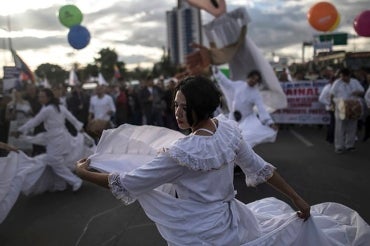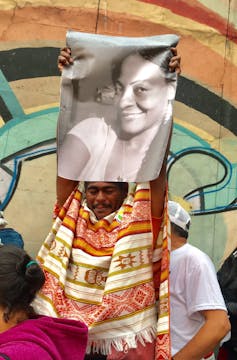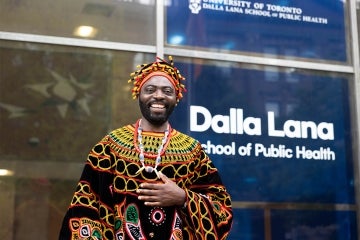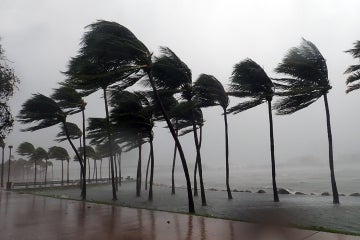El Grito: Violence in Colombia continues to kill activists, U of T expert writes

Published: August 20, 2019
Grito in Spanish can mean “to cry.” For example, the cries of despair of María del Pilar Hurtado’s son in a video that circulated throughout the Colombian media this summer.
In the video, the boy kicks and screams next to his mother’s lifeless body in the town of Tierralta (Córdoba) in Colombia’s northern Caribbean region.
Grito also means a call. The hashtag #Julio26ElGrito is a call to action; the social media response expresses the outrage of many Colombians at the ongoing and rising violence against land and human rights activists.
A community organizer and activist, María del Pilar Hurtado was also a mother, a wife, a sister, a daughter and a Black woman. Hurtado and her family settled in Tierralta after being forcibly displaced from their home in Puerto Tejada, Cauca.
Despite the official ceasefire peace agreement signed by the government and the Revolutionary Armed Forces of Colombia (FARC) leaders in 2016 after 50 years of civil war, criminal armed groups have re-ignited the violence in areas previously occupied by FARC, and where the Colombian state has not established territorial control.
Land theft, displacement, dispossession, assassination and forced disappearances have been the tragic reality. Other key factors maintain and escalate the armed conflict, including rural inequality, displacement, impunity, the illegal drug economy, the military and private armed groups.
Violence against women
In the past decades, Colombia’s rich Pacific Coast region has been at the centre of legal and illegal economic battles. The country’s wealth in natural resources and geo-strategic location make it an attractive target.

The increased presence of state, guerrilla and paramilitary groups has resulted in extreme violence and human rights violations against Black and Indigenous communities. In contexts of war, state and non-state actors perpetrate violence against women in order to instill fear, domination and control against communities that resist dispossession.
Feminicide – the killing of women and girls – represents the most extreme form along a continuum of violence against women and girls.
Research by Betty Ruth Lozano Lerma, an Afro-Colombian sociologist, examines the consequences of feminicides in Afro-Colombian communities. The implications transcend personal and familiar relations and impact their collective rights, disrupting the relationships to their ancestral and traditional territories.
Barriers to justice
Trying to rebuild her family’s life in Tierralta, Hurtado became involved in a dispute over access to land belonging to the mayor’s father.
Following her assassination, the mayor’s office released an official statement dismissing her role as a community organizer and activist.
Access to justice is a problem that many Colombians face. Prejudice against Black women and their communities, a symptom of systemic racism and ongoing colonial violence, creates additional barriers to justice.
Francia Márquez, recipient of the 2018 Goldman Prize for her social and environmental activism, condemned the murder of Hurtado, linking violence against women to structural racism.
Other Afro-Colombian leaders also spoke of the lack of support and protection for the rights of community and social leaders. Audes Jiménez, co-ordinator for the Red Afrolatinoamericana, Afrocaribeña y de la Diáspora, explained that land conflicts are at the centre of threats and assassinations against Afro-Colombian, Indigenous and members of the Juntas de Acción Comunales (community action boards) in the Caribbean region.
The violence in Tierralta and surrounding areas stems from territorial disputes over illicit crops, drug trafficking and illegal mining.
The media circulation of the Hurtado video called attention to Hurtado’s case, including with the authorities. President Ivan Duque, who has spoken about the challenges of protecting the lives of land and human rights activists, sent his condolences to Hurtado’s family.
He joined the people of Cartagena on the streets on July 26th for a protest to denounce violence against community activists. The crowd expressed disapproval for Duque. His government has been openly critical of the peace agreement and has attempted to prevent its implementation
The six points of the peace accord
The Colombian government signed a peace accord with FARC in 2016.
The accord contains six points:
-
Comprehensive land reform addressing social and economic inequality of the rural population
-
Political participation guaranteeing the security and right to exist of all political parties and social organizations
-
Mechanisms for ending the armed conflict including the re-incorporation of FARC members into civilian life and the fight against criminal organizations
-
The manual removal of illicit crops and major crop substitution programs to enable peasants to transition out of coca production
-
A comprehensive system of judicial and extrajudicial mechanisms to address victims’ rights to truth, justice, reparation and non-repetition
-
Mechanisms for monitoring, promoting and verifying the implementation of the Agreement through territorial, ethnic and gender-based perspectives
Voices in exile
Colombians, including those living in Canada, were divided on the terms of the agreement resulting in a rejection of the agreement in a referendum.
After three years, Colombian-Canadians expressed their disappointment at the slow implementation of the agreement. On July 26th, they responded to the call for walking for life and peace in Colombia across six Canadian cities.
The truth commission
A truth commission was established as part of the fifth point in the peace accord to understand what happened during the conflict and why, as well as to identify how future violence can be avoided.
As part of this last aim, the first of a series of public dialogues organised by the commission focused on the violence against activists. The conversation revolved around questions such as: Why are they being killed? What is the responsibility of the state and Colombian society to prevent this violence? What is the impact for these communities, and democracy in Colombia?
Unlike other commissions around the world, the Truth Commission includes the voices of Colombians in exile.
Representatives from the Commission travelled to Montreal and Toronto in April to meet with Colombians in exile, community organizations and academics to begin the process of documenting testimonies.
Meanwhile, the devastating ongoing violence and retaliation against community organizers and human and land rights activists continues. This past weekend, two Indigenous leaders were assassinated by illegal armed groups linked to drug trafficking, prompting the Regional Indigenous Council of Cauca (CRIC) to declare a state of emergency in Colombia.
Diana M. Barrero Jaramillo is a PhD Student at the University of Toronto’s Ontario Institute for Studies in Education.
This article is republished from The Conversation under a Creative Commons license. Read the original article.



